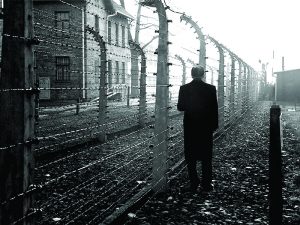Genocide
The word “genocide” was first coined by Polish lawyer Raphael Lemkin in 1944 in his book Axis Rule in Occupied Europe. It consists of the Greek prefix “genos,” meaning “race” or “tribe,” and the Latin suffix “cide,” meaning “killing.” Lemkin developed the term partly in response to the Nazi policies of systematic murder of Jewish people during the Holocaust, but also in response to previous instances in history of targeted actions aimed at the destruction of particular groups of people. Later on, Lemkin led the campaign to have genocide recognized and codified as an international crime. Genocide was first recognized as a crime under international law in 1946 by the United Nations General Assembly I). It was codified as an independent crime in the 1948 Convention on the Prevention and Punishment of the Crime of Genocide (the Genocide Convention).

Ideological and religious superiority and the zeal for dominance serve as the basic excuses for carrying out genocide, ignoring all its ferocious and negative impacts on humanity at large. Genocide has the capability to pit one group against another to such an extent that hatred and a will for extermination blinds all possibility of oneness, integration, and unity. All ideals of humanitarian concern are cut short in the battle for establishing superiority of ideology and of religion.
The potential for genocide in the wake of diminishing ideals of humanity urgently necessitates international intervention. Failing to address this challenge could seriously hamper peace and prosperity across the globe. Studying as well as understanding the impacts of potential genocide in the near future could prevent these evils from spreading. The impact of genocide is not only limited to the sphere of violence and bloodshed. It has spread its demonic claws to haunt the past, present, and future existence of its victims.
Holding the potential to exterminate entire populations, genocide—especially in the twenty-first century—has hindered the growth of the people at the receiving end of its atrocious presence. All strata of the civic framework are disrupted when genocide infects a country. The sociocultural, economic, and political grounds of those victimized by genocide are hampered to a large extent. Genocide not only holds the capacity to disrupt the geographical locale whole and sole, but also to spread disorder in the educational and health domain. For the community or groups at the receiving hand of the perils of genocide, standard education and health facilities can only be a distant dream. Irrespective of age and gender, these victims face extreme physical, mental, sexual, and psychological torture. Genocide even gives rise to other issues like refugee crises, the problem of repatriation, and the question of reintegration.
The impacts of genocide are not just contained within a specific geographical locale; they trespass the boundaries of time and space to haunt the very existence of the communities facing the brunt of modern-age genocide.
Genocides and mass atrocities are dark hallmarks of human history, but so too are efforts to preclude their reoccurrence. Regrettably, the latter have continued to lack the effectiveness required of the collective global community, and it is upon this fact that world leaders and citizens of all countries must focus their energy to realize the changes that will effectively prevent future events of this kind.
*Dr. Mario Silva, PhD(law), Distinguished Fellow, Ryerson University







Redes Sociais - Comentários